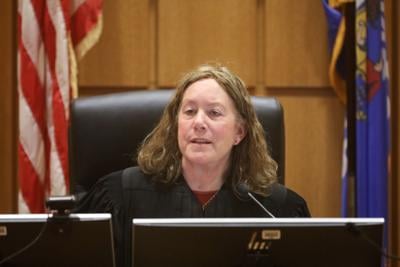A Dane County judge currently under investigation for alleged disrespectful conduct toward defendants has seen twice as many requests from defendants as her peers to move cases out of her courtroom.
Part of the reason Circuit Judge Ellen Berz has seen 427 so-called substitution requests since 2020 is that she’s been assigned solely to criminal cases since before then, and in Wisconsin, defendants under state law are entitled to one judicial substitution per case without having to provide a reason for asking.

Berz
Still, the two other judges who have been solely assigned to criminal cases since 2020, John Hyland and Nicholas McNamara, have seen far fewer such substitution requests — five and 185, respectfully — and state law also allows both defendants and plaintiffs in civil cases the same one-time, no-questions-asked substitution, meaning the potential for such requests is double that in criminal cases.
People are also reading…
Berz did not respond to requests for comment for this story.
It’s difficult to know why defendants in Berz’s courtroom are asking to have her taken off their cases at a disproportionate rate, largely because criminal defense attorneys are wary of criticizing a judge who could decide their clients’ cases.
One of the attorneys who asked for a substitution in Berz’s courtroom, and who asked not to be identified, said the request was less about Berz than it was about the chance to get a different prosecutor if the case was moved to a different courtroom.
Nine other attorneys who have recently asked to have Berz removed did not respond to requests for comment, nor did the State Public Defender’s office.
UW-Madison clinical associate law professor John P. Gross, a former criminal defense attorney, said that typically when a criminal court judge sees a lot of requests from defense attorneys to move cases out of a courtroom, it’s because the judge has developed a reputation for being “particularly harsh when it comes to sentencing.”
Other reasons could include that an attorney has disagreed with some of the judge’s past rulings, that a client has said something seen as inflammatory that upsets the judge, or that the judge has a poor judicial temperament, he said.
“If you’ve got 17 options for a judge and you’re seeing one particular judge with an outlier rate at substitution requests ... that means that that judge has got a reputation as somebody who is an outlier in terms of sentencing or conducts trials in a way that might be hostile toward the defense or is reluctant to grant suppression motions or any of the above,” he said.
Dane County’s chief judge, Julie Genovese, said she didn’t “have any personal knowledge of why people are substituting on certain judges,” and that one would have to ask the attorneys making the requests to find out.
She said she hadn’t been aware of Berz’s unusually high number of substitution requests before the Wisconsin State Journal requested the data. Asked if she would bring the matter up with Berz, she said “maybe,” but she declined to comment on specific judges.
As elected officials, judges aren’t subject to any kind of formal employee review process by the chief judge or any other official or body, although complaints can be filed against judges with the Wisconsin Judicial Commission. The commission reviews complaints and decides if there is probable cause to send it to the Wisconsin Supreme Court, which oversees all state judges, and the high court can decide to appoint a panel to recommend any discipline of the judge that it thinks the high court should impose.
‘You’re not playing that game’
According to the commission’s complaint against Berz, the judge likely violated four rules requiring judges to be unbiased and have “high standards of conduct,” and to treat people they come into contact with as part of their duties “with patience, dignity and courtesy.”
It points to two incidents in particular:
At a May 31, 2019, hearing in a child sexual assault and bail jumping case, Berz warned that “this court will not forget” defendant Richard H. Harrison’s request for another delay in his trial if Harrison were ultimately found guilty, which he was by a jury on all counts on Nov. 22 of that year.
“You’re not playing that game anymore after this,” Berz told Harrison, according to transcripts. “Go to the prison and talk to them about all the games you can play. We’re done here. Clear? Mr. Harrison, clear?”
The two then got into a brief back-and-forth in which Harrison told Berz “your sarcasm is extremely clear” and Berz retorted, “Good. I thought it would be. That’s why I’m saying it to you that way, because I thought you would relate with that.”
In the second incident, on Dec. 13, 2021, Berz ordered a bailiff to leave her courtroom to go arrest defendant Noah A. Hodges, who was facing drug-related and bail-jumping charges and who didn’t show up that day for his trial because, his attorney told Berz, he was in the hospital.
When the bailiff said he could not leave the courthouse to make the arrest, Berz said she would do it herself and set out with Hodges’ attorney in her own car in the direction of the hospital.
“Judge Berz also stated that, if something happened to her when she went to pick up the defendant, they would hear about it on the news,” the complaint alleges.
The complaint says “Hodges’ attorney told the judge that this trip was a bad idea, as the judge is to be the neutral decision maker in the case.”
Berz reportedly told Hodges’ attorney that “if she truly thought they should turn around, they would turn around.” The attorney said they should turn around and Berz then took them back to the courthouse, the complaint says.
Hodges in April 2023 pleaded guilty in the case to one count of fifth- or sixth-offense driving while under the influence of a controlled substance. Four other charges were dismissed as part of a deal with prosecutors.
Berz in a court filing has admitted to the allegations against her, and she and the commission have also agreed that a seven-day suspension would be appropriate punishment, but the review panel created for her case has asked both parties to submit briefs on past judicial misconduct decisions to help it better make a decision.
It wasn’t clear when that panel would complete its work and the high court impose any discipline, but the commission had until Tuesday to file its brief and Berz has until 25 days after that brief is filed to file her response.
Photos: Israelis protest proposed judicial changes

Israelis protest against plans by Prime Minister Benjamin Netanyahu's new government to overhaul the judicial system outside the Knesset, Israel's parliament in Jerusalem, Monday, Feb. 20, 2023. Israel's government is pressing ahead with its contentious plan to overhaul the country's legal system. A vote in parliament on Monday is due despite an unprecedented uproar that has included mass demonstrations, warnings from military and business leaders and calls for restraint from the U.S. (AP Photo/Ohad Zwigenberg)

Israelis protest against plans by Prime Minister Benjamin Netanyahu's new government to overhaul the judicial system outside the Knesset, Israel's parliament in Jerusalem, Monday, Feb. 20, 2023. Israel's government is pressing ahead with its contentious plan to overhaul the country's legal system. A vote in parliament on Monday is due despite an unprecedented uproar that has included mass demonstrations, warnings from military and business leaders and calls for restraint from the U.S. (AP Photo/Ohad Zwigenberg)

Israelis protest against plans by Prime Minister Benjamin Netanyahu's new government to overhaul the judicial system outside the Knesset, Israel's parliament in Jerusalem, Monday, Feb. 20, 2023. Israel's government is pressing ahead with its contentious plan to overhaul the country's legal system. A vote in parliament on Monday is due despite an unprecedented uproar that has included mass demonstrations, warnings from military and business leaders and calls for restraint from the U.S. (AP Photo/Ohad Zwigenberg)

Israelis protest against plans by Prime Minister Benjamin Netanyahu's new government to overhaul the judicial system outside the Knesset, Israel's parliament in Jerusalem, Monday, Feb. 20, 2023. Israel's government is pressing ahead with its contentious plan to overhaul the country's legal system. A vote in parliament on Monday is due despite an unprecedented uproar that has included mass demonstrations, warnings from military and business leaders and calls for restraint from the U.S. (AP Photo/Ohad Zwigenberg)

An Israeli protests against plans by Prime Minister Benjamin Netanyahu's new government to overhaul the judicial system outside the Knesset, Israel's parliament in Jerusalem, Monday, Feb. 20, 2023. Israel's government is pressing ahead with its contentious plan to overhaul the country's legal system. A vote in parliament on Monday is due despite an unprecedented uproar that has included mass demonstrations, warnings from military and business leaders and calls for restraint from the U.S. (AP Photo/Ohad Zwigenberg)

Protesters supporting women's rights dressed as characters from The Handmaid's Tale TV series attend a protest against plans by Prime Minister Benjamin Netanyahu's new government to overhaul the judicial system in Tel Aviv, Monday, Feb. 20, 2023. Israel's government on Monday was pressing ahead with a contentious plan to overhaul the country's legal system, despite an unprecedented uproar that has included mass protests, warnings from military and business leaders and calls for restraint by the United States. (AP Photo/Oded Balilty)

Protesters supporting women's rights dressed as characters from The Handmaid's Tale TV series attend a protest against plans by Prime Minister Benjamin Netanyahu's new government to overhaul the judicial system in Tel Aviv, Israel, Monday, Feb. 20, 2023. Israel's government on Monday was pressing ahead with a contentious plan to overhaul the country's legal system, despite an unprecedented uproar that has included mass protests, warnings from military and business leaders and calls for restraint by the United States. (AP Photo/Oded Balilty)

Israelis protest against plans by Prime Minister Benjamin Netanyahu's new government to overhaul the judicial system in Haifa, Israel, Monday, Feb. 20, 2023. Israel's government on Monday was pressing ahead with a contentious plan to overhaul the country's legal system, despite an unprecedented uproar that has included mass protests, warnings from military and business leaders and calls for restraint by the United States. (AP Photo/Ariel Schalit)















